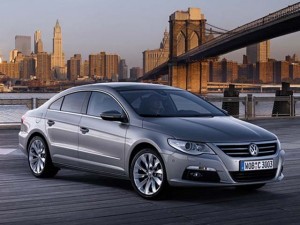
Though Volkswagen has lagged in recent quality surveys, products like the CC excelled in the APEAL study, which measures things owners find gratifying.
Porsche is the most APEAL-ing automotive brand on the market, according to a new study by J.D. Power and Associates, though Volkswagen has four of the most APEAL-ing products on the road, more than any other manufacturer.
The auto industry, on the whole, is producing products with more APEAL, reveals the 2009 Automotive Performance, Execution and Layout Study. Notably, Japanese vehicles lagged in the award, with some brands that do well on traditional quality surveys — such as Toyota — ranking near the bottom.
The APEAL study differs from traditional automotive surveys, such as Power’s own Initial Quality Survey, or IQS, in that it focuses on those things consumers find attractive about their vehicles — Things Gone Right, in industry parlance — rather than Things Gone Wrong. Nearly 81,000 new car buyers were asked ranked how gratifying their vehicles are to own and drive according to 90 specific criteria. How it correlates to sales is unknown.
On a scale where a perfect product would score 1,000, new and redesigned models achieved a score of 790 points in this year’s APEAL study, 11 points higher than last year. That’s 15 points higher than carryover vehicles, Power reports.
“Most automakers are on track in terms of designing new models that are highly appealing,” said David Sargent, Power’s vice president of automotive research. “The greater challenge for manufacturers lies in creating models that launch with both strong appeal and high quality, which ultimately lead to improved sales through greater customer loyalty and advocacy.”
There are some points of correlation between the APEAL study and Power’s quality reports. Porsche grabbed top honors in both APEAL and the most recent IQS. Cadillac, which ranked high on the 2009 Initial Quality study, also came in third on APEAL.
But there are also some marked differences. Jaguar, which suffered from a number of quality problems in IQS, came in second on the 2009 APEAL.
And, significantly, there were only two Japanese marques in the APEAL study’s Top 10 brands, Lexus and Infiniti, and three that scored better than the industry average of 779 points. Toyota, for example, scored just 756 points, placing it sixth from the bottom of the list.
On the other hand, European makers, which have often suffered from nagging quality issues, excel when it comes to offering customers the sort of surprise-and-delight features that APEAL is designed to measure. Led by Porsche and Jaguar, six European brands dominated the study’s Top 10, and nine ranked above industry average.
Meanwhile, Power data reveals that domestic Big Three brands were the most improved marques, led by Dodge, then Pontiac, Buick and Cadillac.
While Porsche captured the top spot among all brands, it captured the top spot in just one individual segment, with its Cayenne SUV. Volkswagen, however, ranked tops in four –more than any other brand — with its CC, Passat, Tiguan and GTI models. Ford, Honda, Mercedes-Benz and Nissan each garnered two segment awards. Chevrolet, Dodge, Hyundai and Mini also captured segment awards.
The increase in APEAL this past year was strongly influenced by fuel economy, according to Power data. For one thing, this year’s dip in gasoline prices meant that consumers were less focused on the fuel economy of their vehicles, said Sargent. At the same time, many vehicles have improved their mileage with recent updates.
“For example, the Ford F-150, Cadillac Escalade, Volkswagen Jetta and redesigned Dodge Ram have all made major strides in owner satisfaction with fuel economy through the introduction of more efficient powertrains,” Sargent said.
Significantly, half of all models included in the 2009 APEAL study were offered with four-cylinder engines, up from just 39% in 2008.

